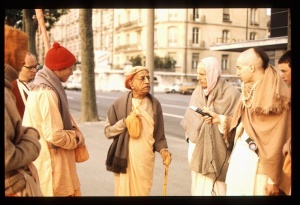CC Madhya 17.80: Difference between revisions
m (1 revision(s)) |
No edit summary |
||
| Line 1: | Line 1: | ||
{{ | [[Category:Sri Caitanya-caritamrta - Madhya-lila Chapter 17|C080]] | ||
<div style="float:left">'''[[Sri Caitanya-caritamrta|Śrī Caitanya-caritāmṛta]] - [[CC Madhya|Madhya-līlā]] - [[CC Madhya 17|Chapter 17: The Lord Travels to Vṛndāvana]]'''</div> | |||
<div style="float:right">[[File:Go-previous.png|link=CC Madhya 17.79|Madhya-līlā 17.79]] '''[[CC Madhya 17.79|Madhya-līlā 17.79]] - [[CC Madhya 17.81|Madhya-līlā 17.81]]''' [[File:Go-next.png|link=CC Madhya 17.81|Madhya-līlā 17.81]]</div> | |||
{{CompareVersions|CC|Madhya 17.80|CC 1975|CC 1996}} | |||
{{RandomImage}} | |||
==== TEXT 80 ==== | ==== TEXT 80 ==== | ||
<div | <div class="verse"> | ||
mūkaṁ karoti vācālaṁ | :mūkaṁ karoti vācālaṁ | ||
paṅguṁ laṅghayate girim | :paṅguṁ laṅghayate girim | ||
yat-kṛpā tam ahaṁ vande | :yat-kṛpā tam ahaṁ vande | ||
paramānanda-mādhavam | :paramānanda-mādhavam | ||
</div> | </div> | ||
| Line 14: | Line 18: | ||
==== SYNONYMS ==== | ==== SYNONYMS ==== | ||
<div | <div class="synonyms"> | ||
''mūkam''—a person who cannot speak; ''karoti''—makes; ''vācālam''—an eloquent speaker; ''paṅgum''—a person who cannot even walk; ''laṅghayate''—causes to cross over; ''girim''—the mountain; ''yat-kṛpā''—whose mercy; ''tam''—unto Him; ''aham''—I; ''vande''—offer obeisances; ''parama-ānanda''—the transcendentally blissful; ''mādhavam''—Supreme Personality of Godhead. | |||
</div> | </div> | ||
| Line 21: | Line 25: | ||
==== TRANSLATION ==== | ==== TRANSLATION ==== | ||
<div | <div class="translation"> | ||
“‘The Supreme Personality of Godhead has the form of sac-cid-ānanda-vigraha ( | “‘The Supreme Personality of Godhead has the form of sac-cid-ānanda-vigraha (BS 5.1)—transcendental bliss, knowledge and eternity. I offer my respectful obeisances unto Him, who turns the dumb into eloquent speakers and enables the lame to cross mountains. Such is the mercy of the Lord.’” | ||
</div> | </div> | ||
| Line 28: | Line 32: | ||
==== PURPORT ==== | ==== PURPORT ==== | ||
<div | <div class="purport"> | ||
This is a quotation from the Bhāvārtha-dīpikā commentary on Śrīmad-Bhāgavatam ([[SB 1.1.1]]). | This is a quotation from the ''Bhāvārtha-dīpikā'' commentary on ''Śrīmad-Bhāgavatam'' ([[SB 1.1.1]]). | ||
</div> | </div> | ||
__NOTOC__ | |||
<div style="float:right; clear:both;">[[File:Go-previous.png|link=CC Madhya 17.79|Madhya-līlā 17.79]] '''[[CC Madhya 17.79|Madhya-līlā 17.79]] - [[CC Madhya 17.81|Madhya-līlā 17.81]]''' [[File:Go-next.png|link=CC Madhya 17.81|Madhya-līlā 17.81]]</div> | |||
__NOTOC__ | |||
__NOEDITSECTION__ | |||
Revision as of 17:19, 22 October 2021

A.C. Bhaktivedanta Swami Prabhupada
TEXT 80
- mūkaṁ karoti vācālaṁ
- paṅguṁ laṅghayate girim
- yat-kṛpā tam ahaṁ vande
- paramānanda-mādhavam
SYNONYMS
mūkam—a person who cannot speak; karoti—makes; vācālam—an eloquent speaker; paṅgum—a person who cannot even walk; laṅghayate—causes to cross over; girim—the mountain; yat-kṛpā—whose mercy; tam—unto Him; aham—I; vande—offer obeisances; parama-ānanda—the transcendentally blissful; mādhavam—Supreme Personality of Godhead.
TRANSLATION
“‘The Supreme Personality of Godhead has the form of sac-cid-ānanda-vigraha (BS 5.1)—transcendental bliss, knowledge and eternity. I offer my respectful obeisances unto Him, who turns the dumb into eloquent speakers and enables the lame to cross mountains. Such is the mercy of the Lord.’”
PURPORT
This is a quotation from the Bhāvārtha-dīpikā commentary on Śrīmad-Bhāgavatam (SB 1.1.1).